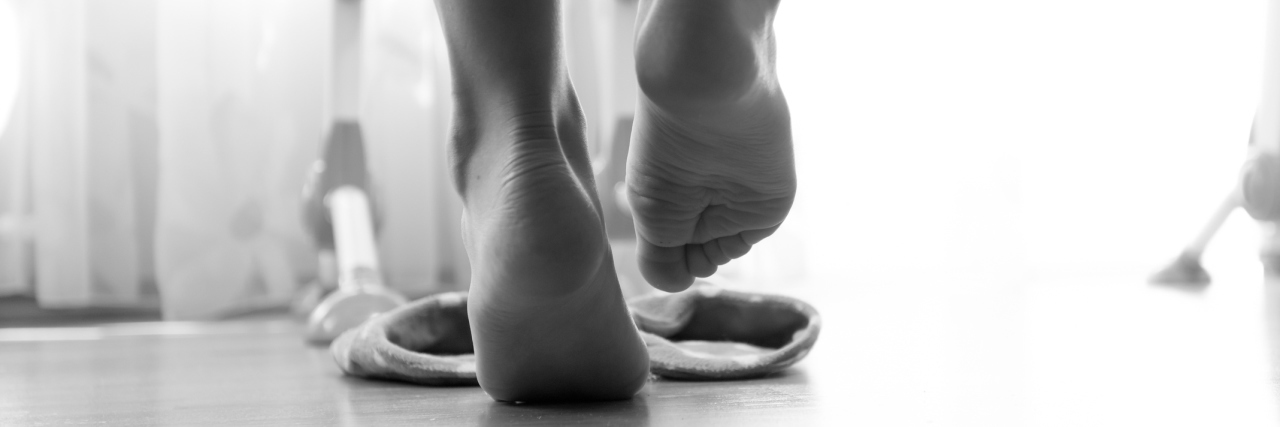My 76-year-old mother has endured a year of medical challenges — three surgeries, numerous transfusions and more hospital visits and testing than anyone deserves.
Before each hospital stay she has a pedicure, deliberating over just the right shade. She knows her toes will be quickly covered by those ugly brown skid-resistant socks. But she polishes away, as if two coats of OPI were as potent as painkillers.
I get it. We want to present our best selves to our doctors — scrubbed clean, tidy, pleasant. Our insides may be hurting, but by God, the exterior will be intact and bravely smiling.
Who hasn’t pulled the Hail Mary pass of furiously flossing the day before a dentist visit? Shaving your legs smooth before you hoist them in the gynecologist’s stirrups? Ignoring the directive to avoid deodorant prior to your mammogram?
We strive to please, and present no offense by way of plaque, stubble or stench.
My mother’s toenails match the pink of her Revlon lipstick. She smiles — at receptionists, nurses, aides — and positively beams at the doctor. Like me. Heal me. Give me good news — and just five more minutes than the allotted 10.
The waiting room is a place where we wait to be judged. We know the judgment will be made by science — by scans, blood work and the mysteries contained in the closely-held clipboard. But blind science is matched by blind faith — faith that being good will yield positive prognosis.
Visiting the doctor is like a first date, only with higher stakes. The visits are accompanied by the same level of anxiety and eagerness to make a good impression. And like a first date, we lie just a bit: “Yes, I eat lots of vegetables. I love spin class. Just two glasses of wine a week — good for the heart, you know.”
We know. And the doctors know, too. They see through our flirty fibs, and if they’re kind and compassionate, they allow us to hold on to the artifice of medical courtship.
We’ll take any compliment we can get from a doctor: “Your stitches are healing beautifully. Your colon is clean and polyp-free. You have the leg strength of a 40-year-old. Keep up the good work.”
We replay those words on a loop, relaying them boastfully to those who love and worry about us.
My mother is smitten with her tall, dark and charming gastroenterologist. She calls him the “Italian Stallion” — a man who plies her with horrid prep concoctions and then sends a camera through her intestinal track. What’s not to love?
And when my husband’s cancer surgeon told us, “I really like you both and am sorry to only deliver disappointing news,” it helped just a bit, and gave us hope that maybe the next date would go better. He likes us. He’s committed. He’ll do his very best.
Years ago, a dear friend was diagnosed with breast cancer. She had retired from an executive corporate role the previous year, but pulled out all the stops before her oncology referral — power suit, high-heeled pumps, statement jewelry. She told me she wanted to appear together and in control at a time when everything else was spiraling out of control.
The statement that a David Yurman bracelet or Carnation-hued toenails makes is poignant: “I’m making an effort. I take care of myself. Take care of me, please.”
Yet disease is the ultimate leveler. The well-to-do and well-dressed among us are as vulnerable as those who are less so. And sometimes it doesn’t matter if you’ve followed all the rules — healthy diet, regular exercise, liberal applications of sun screen, daily dosing of vitamins.
Despite our best efforts, bad things do happen to good people.
I believe our desire to please and maintain is more about valor than vanity, and linked to our survival instinct. Keeping up appearances is keeping up, after all. If we can button a blouse, tie our shoes and add some color to our cheeks, that’s a good thing. We’re still in the game.
We can look in the mirror and face a new day.
Awaiting transportation to the rehabilitation facility, my mother brushed her hair, powdered her face and searched her purse for an eye pencil. She couldn’t walk or use the toilet unassisted. The day before, my brother had wiped her bum, and wept. But she was determined to take care of her toilette. She had another first date with a new set of caregivers — another chance to make a good first impression.
Perhaps this is why nursing homes employ generously-tipped hair stylists … why our mothers tell us to wear clean underwear in case we’re hit by a car… why my own mother has made me vow to tweeze her chin hairs if she’s ever in a coma or otherwise incapable of grooming herself.
I will do that for her — and paint her toenails, too. Because a hospital gown needs all the help it can get. And so do we.
We want to hear your story. Become a Mighty contributor here.
Thinkstock photo by Artfoliophoto

